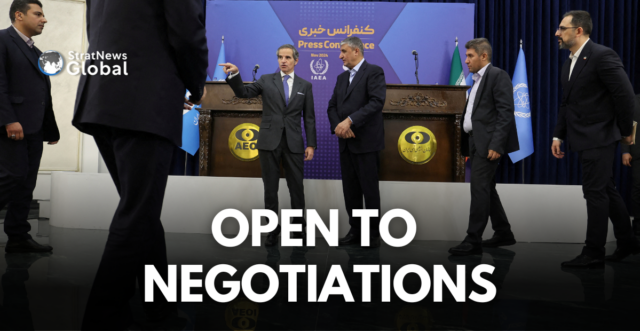Iran is willing to end an impasse over a range of issues with the U.N. nuclear agency on its atomic programme but it will not succumb to pressure, its foreign minister said after meeting the watchdog’s chief in Tehran on Thursday.
Diplomats told Reuters on Wednesday that European powers (E3) are pushing for a new resolution against Iran by the International Atomic Energy Agency (IAEA) board next week to pressure Tehran over what they view as its poor cooperation.
‘Rational Policy’
The talks took place with Donald Trump due to take office again as U.S. President in January. During his previous tenure, the United States pulled out of the 2015 nuclear accord between Iran and six world powers aimed at curbing Tehran’s sensitive nuclear work. It is unclear whether Trump will continue his “maximum pressure” policy on Iran when he takes office.
Foreign Minister Abbas Araqchi, writing on X following his talks with IAEA chief Rafael Grossi, said: “The ball is in the EU/E3 court. Willing to negotiate based on our national interest and inalienable rights, but not ready to negotiate under pressure and intimidation.”
Iranian state media also quoted him as saying: “I hope the other side will adopt a rational policy.”
Iran-IAEA Relations
Relations between Tehran and the IAEA have soured over several long-standing issues. This includes Iran barring the agency’s uranium-enrichment experts from the country and its failure to explain uranium traces found at undeclared sites.
In August, the agency said Iran’s production of highly enriched uranium continues and it has not improved cooperation with it despite a resolution passed by the IAEA Board of Governors in June.
Grossi, who has long sought progress with Tehran over its fast-advancing nuclear work, said: “Inspections are just one chapter of our cooperation and cannot be discussed.”
The U.S. withdrawal from the nuclear pact in 2018 and the reimposition of sanctions prompted Iran to violate limitations on its uranium enrichment – seen by the West as a disguised effort to develop nuclear weapons capability.
Constructive Meeting
Tehran is now enriching uranium to up to 60% fissile purity, close to the roughly 90% required for an atom bomb. Tehran says its nuclear work is purely for peaceful purposes.
Iran’s nuclear chief Mohammad Eslami said his meeting with Grossi was “constructive” but he warned that Tehran would react immediately to any resolution against it at an IAEA meeting next week, without elaborating.
A senior Iranian official told Reuters on Wednesday that Tehran’s reaction to a resolution could be to limit diplomatic and technical cooperation with the IAEA.
Grossi, in a televised joint press conference with Eslami, urged Tehran to take steps to resolve the remaining issues.
“It is in our power here to take concrete steps that will indicate clearly, to the U.S. and the international community, that we can clarify things and move forward with concrete solutions,” Grossi said.
Grossi, who arrived in Tehran on Wednesday, is expected to meet Iranian President Masoud Pezeshkian for the first time since he took office in August.
(with inputs from Reuters)





